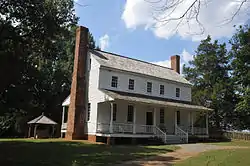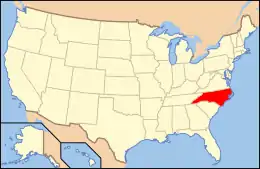House in the Horseshoe
The House in the Horseshoe, also known as the Alston House, is a historic house in Glendon, North Carolina in Moore County, and a historic site managed by the North Carolina Department of Natural and Cultural Resources' Historic Sites division. The home, built in 1772 by Philip Alston, was the site of a battle between loyalists under the command of David Fanning and patriot militiamen under Alston's command on either July 29 or August 5, 1781 (the date being unclear in available records).[2] The battle ended with Alston's surrender to Fanning, in which Alston's wife negotiated the terms with the loyalists.[3][4]
Alston House | |
 | |
  | |
| Nearest city | Carthage, North Carolina |
|---|---|
| Coordinates | 35°28′1.6″N 79°23′0.5″W |
| Built | 1772 |
| Architect | Phillip Alston |
| Architectural style | Coastal lowlands-style |
| MPS | Moore County MRA (AD) |
| NRHP reference No. | 70000462[1] |
| Added to NRHP | February 26, 1970 |
In 1798, the home was sold to Benjamin Williams, who would become Governor of North Carolina from 1799–1802, and again in 1807–1808. Williams owned approximately 103 slaves and produced about 300 acres of cotton annually at the site of the house.[3]
The Moore County Historical Association purchased the home in 1954, and ownership was then transferred to the state in 1955. The property was made a North Carolina Historic Site in 1971. It was added to the National Register of Historic Places in 1970.[1] The property is now used as a museum and as the site of Revolutionary War reenactments and living history demonstrations each year.[5]
References
- "National Register Information System". National Register of Historic Places. National Park Service. July 9, 2010.
- William H. Thompson Jr.,"House in the Horseshoe", Encyclopedia of North Carolina, William S. Powell, ed. (UNC Press, 2006)
- Thompson, Jessica. "House in the Horseshoe". North Carolina History Project. John Locke Foundation. Retrieved December 20, 2012.
- John B. Wells, III (April 1971). "Alston House" (pdf). National Register of Historic Places - Nomination and Inventory. North Carolina State Historic Preservation Office. Retrieved February 1, 2015.
- "Carthage house saw Revolutionary War battle". WRAL.com. Capital Broadcasting Company. June 17, 2011. Retrieved December 20, 2012.
External links

